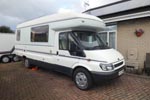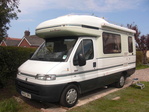Power inverter connected feeding 230V sockets
+2
modelman
gobsmacked
6 posters
The Auto-Sleeper Motorhome Owners Forum (ASOF) :: Auto-Sleeper Motorhome Forums :: Auto-Sleeper "Van Conversions" Forum
Page 1 of 1
 Power inverter connected feeding 230V sockets
Power inverter connected feeding 230V sockets
We are considering installing a pure sinus inverter in our Warwick XL.
I was wondering if there is any "safe" way to connect it to the 230v sockets, of course when not connected to the mains.
Ideally would like to avoid pulling cables from the inverter to run the 230v appliances and just use the existing sockets.
Anybody has done such installation?
Thanks
I was wondering if there is any "safe" way to connect it to the 230v sockets, of course when not connected to the mains.
Ideally would like to avoid pulling cables from the inverter to run the 230v appliances and just use the existing sockets.
Anybody has done such installation?
Thanks
_________________
A & C & J

gobsmacked- Member

-

Posts : 118
Joined : 2020-09-17
Location : Sweden/Denmark
Auto-Sleeper Model : Warwick XL
Vehicle Year : 2018
 Re: Power inverter connected feeding 230V sockets
Re: Power inverter connected feeding 230V sockets
Even 'good' inverters are inefficient, I think using one will give the batteries a bit of a hammering, the 'lectrickery' experts on here will soon tell you.
_________________
I DO have to grow old, I DO NOT have to grow up!

modelman- Donator

-

Posts : 5313
Joined : 2011-09-16
Member Age : 78
Location : Barnsley,S/Yorks
Auto-Sleeper Model : Amethyst
Vehicle Year : 2003
gobsmacked likes this post
 Re: Power inverter connected feeding 230V sockets
Re: Power inverter connected feeding 230V sockets
Thanks, for the sake of the discussion I would add that we have 1 x high performance lithium battery LiFeP04 110 12v 110 AH. Planning to add another one of the very same typemodelman wrote:Even 'good' inverters are inefficient, I think using one will give the batteries a bit of a hammering, the 'lectrickery' experts on here will soon tell you.
_________________
A & C & J

gobsmacked- Member

-

Posts : 118
Joined : 2020-09-17
Location : Sweden/Denmark
Auto-Sleeper Model : Warwick XL
Vehicle Year : 2018
 Re: Power inverter connected feeding 230V sockets
Re: Power inverter connected feeding 230V sockets
110ah lithium, lead-acid or gel is still 110ah & they will still get a hammering, & sure, of course it will work.
I use lithiums on several of my motorbikes, they're great ,but got to be careful charging them, can't use a 'normal' charger.
I use lithiums on several of my motorbikes, they're great ,but got to be careful charging them, can't use a 'normal' charger.
_________________
I DO have to grow old, I DO NOT have to grow up!

modelman- Donator

-

Posts : 5313
Joined : 2011-09-16
Member Age : 78
Location : Barnsley,S/Yorks
Auto-Sleeper Model : Amethyst
Vehicle Year : 2003
 Re: Power inverter connected feeding 230V sockets
Re: Power inverter connected feeding 230V sockets
The one we have right now is directly managed by the Sargent PX300 three-stage charger. And if I understand the schematics there is an available connection for a second onemodelman wrote:110ah lithium, lead-acid or gel is still 110ah & they will still get a hammering, & sure, of course it will work.
I use lithiums on several of my motorbikes, they're great ,but got to be careful charging them, can't use a 'normal' charger.
_________________
A & C & J

gobsmacked- Member

-

Posts : 118
Joined : 2020-09-17
Location : Sweden/Denmark
Auto-Sleeper Model : Warwick XL
Vehicle Year : 2018
 Re: Power inverter connected feeding 230V sockets
Re: Power inverter connected feeding 230V sockets
gobsmacked wrote:
The one we have right now is directly managed by the Sargent PX300 three-stage charger. And if I understand the schematics there is an available connection for a second one
Perhaps there are several versions of the PX300, but as far as I'm aware, the "original" version of the PX300 is not specified as being compatible with LiFePO4 batteries.

Roopert- Member

-

Posts : 3802
Joined : 2019-03-10
Location : South East
Auto-Sleeper Model : Trooper
Vehicle Year : 2005
 Re: Power inverter connected feeding 230V sockets
Re: Power inverter connected feeding 230V sockets
I spoke to Sergent today and as far as batteries they said it was fine. I could go up to 220 AH, so 2 x 110 AH was fine.Roopert wrote:gobsmacked wrote:
The one we have right now is directly managed by the Sargent PX300 three-stage charger. And if I understand the schematics there is an available connection for a second one
Perhaps there are several versions of the PX300, but as far as I'm aware, the "original" version of the PX300 is not specified as being compatible with LiFePO4 batteries.
Anyway, the main issue her is connecting the 230v output of an inverter to the 230v wiring and reuse the sockets, if doable and how to do that
_________________
A & C & J

gobsmacked- Member

-

Posts : 118
Joined : 2020-09-17
Location : Sweden/Denmark
Auto-Sleeper Model : Warwick XL
Vehicle Year : 2018
 Re: Power inverter connected feeding 230V sockets
Re: Power inverter connected feeding 230V sockets
As I understand the situation, a standard lead/acid profile will function, but it may not be able to charge a LiFEPO4 battery fully, and it may under some circumstances reduce the working life of the battery. If I were spending that much on a battery, I'd want to use a charger that is specifically designed for that technology, but of course, that's up to you!
There are a number of ways of connecting up an inverter to existing sockets, depending on what functions you need and how much you are prepared to pay. At the simplest level it's possible to simply arrange a changeover relay, so that (for example) the loss of 240V causes the inverter to be switched into circuit for the mains socket(s), and causes it to drop out when mains is available again. Or you can buy inverter/chargers which integrate inverter, charger and power control into one unit (or several interconnected units). The Victron MultiPlus range has products that will do this - no doubt there are plenty of others.
The solution that you choose will also be guided by your own level of experience at 240V installations, and whether you intend to have the work done by an electrician. The simplest of approaches (a changeover relay) is something that is probably not recommended as a DIY project - simply because a small mistake could have serious consequences. However, an electrician may be unwilling to home-brew a solution, and may only be willing to install products that are designed and approved for the purpose.
As an additional factor, I have no idea what regulatory constraints apply to electrical installations in Denmark and Sweden which might affect what you are allowed to do (or have done) within a motorhome.
There are a number of ways of connecting up an inverter to existing sockets, depending on what functions you need and how much you are prepared to pay. At the simplest level it's possible to simply arrange a changeover relay, so that (for example) the loss of 240V causes the inverter to be switched into circuit for the mains socket(s), and causes it to drop out when mains is available again. Or you can buy inverter/chargers which integrate inverter, charger and power control into one unit (or several interconnected units). The Victron MultiPlus range has products that will do this - no doubt there are plenty of others.
The solution that you choose will also be guided by your own level of experience at 240V installations, and whether you intend to have the work done by an electrician. The simplest of approaches (a changeover relay) is something that is probably not recommended as a DIY project - simply because a small mistake could have serious consequences. However, an electrician may be unwilling to home-brew a solution, and may only be willing to install products that are designed and approved for the purpose.
As an additional factor, I have no idea what regulatory constraints apply to electrical installations in Denmark and Sweden which might affect what you are allowed to do (or have done) within a motorhome.

Roopert- Member

-

Posts : 3802
Joined : 2019-03-10
Location : South East
Auto-Sleeper Model : Trooper
Vehicle Year : 2005
gobsmacked likes this post
 Re: Power inverter connected feeding 230V sockets
Re: Power inverter connected feeding 230V sockets
Roopert wrote:As I understand the situation, a standard lead/acid profile will function, but it may not be able to charge a LiFEPO4 battery fully, and it may under some circumstances reduce the working life of the battery. If I were spending that much on a battery, I'd want to use a charger that is specifically designed for that technology, but of course, that's up to you!
There are a number of ways of connecting up an inverter to existing sockets, depending on what functions you need and how much you are prepared to pay. At the simplest level it's possible to simply arrange a changeover relay, so that (for example) the loss of 240V causes the inverter to be switched into circuit for the mains socket(s), and causes it to drop out when mains is available again. Or you can buy inverter/chargers which integrate inverter, charger and power control into one unit (or several interconnected units). The Victron MultiPlus range has products that will do this - no doubt there are plenty of others.
The solution that you choose will also be guided by your own level of experience at 240V installations, and whether you intend to have the work done by an electrician. The simplest of approaches (a changeover relay) is something that is probably not recommended as a DIY project - simply because a small mistake could have serious consequences. However, an electrician may be unwilling to home-brew a solution, and may only be willing to install products that are designed and approved for the purpose.
As an additional factor, I have no idea what regulatory constraints apply to electrical installations in Denmark and Sweden which might affect what you are allowed to do (or have done) within a motorhome.
Thank you very much for the heads up regarding the battery. I have found the link to the PX300 charger documentation and I will verify the charge profile with the battery documentation,
Truth is that we just bought our used van and it came with the LiFEPO4 battery. But of course, before adding a second one we need to verify what you pointed out. Thanks for that.
I have looked at the Victron and it absolut looks interesting. I will present that as suggestion together with the changeover relay to the electrician that will eventually do the modification.
Absolutely no intention to mess with the EL installation on my own:-)
Thanks for the good advices.
Have a good day
_________________
A & C & J

gobsmacked- Member

-

Posts : 118
Joined : 2020-09-17
Location : Sweden/Denmark
Auto-Sleeper Model : Warwick XL
Vehicle Year : 2018
 Re: Power inverter connected feeding 230V sockets
Re: Power inverter connected feeding 230V sockets
having a large inverter as a 'built in' extra is a very popular option on larger, upmarket vans.....so this is something that is done regularly.
their large water tanks, multiple battery systems and inverters give owners much time away from ehu yet retain the ability to use most mains electrical devices....within reason!
even with a large lithium battery and a good inverter, using hairdriers or microwaves will pull the battery down, so replenishment is vital, which will lead you fitting to a good solar bank....
some popular uses for the system you are consifpdering might include hairdriers, as above, and the charging of electric bike batteries...
where possible, remember is easier to use gas or 12v for devices that support this.
good luck, some good fun ahead when you become fully free of sites.
their large water tanks, multiple battery systems and inverters give owners much time away from ehu yet retain the ability to use most mains electrical devices....within reason!
even with a large lithium battery and a good inverter, using hairdriers or microwaves will pull the battery down, so replenishment is vital, which will lead you fitting to a good solar bank....
some popular uses for the system you are consifpdering might include hairdriers, as above, and the charging of electric bike batteries...
where possible, remember is easier to use gas or 12v for devices that support this.
good luck, some good fun ahead when you become fully free of sites.

Guest- Guest
 Re: Power inverter connected feeding 230V sockets
Re: Power inverter connected feeding 230V sockets
bolero boy wrote:having a large inverter as a 'built in' extra is a very popular option on larger, upmarket vans.....so this is something that is done regularly.
their large water tanks, multiple battery systems and inverters give owners much time away from ehu yet retain the ability to use most mains electrical devices....within reason!
even with a large lithium battery and a good inverter, using hairdriers or microwaves will pull the battery down, so replenishment is vital, which will lead you fitting to a good solar bank....
some popular uses for the system you are consifpdering might include hairdriers, as above, and the charging of electric bike batteries...
where possible, remember is easier to use gas or 12v for devices that support this.
good luck, some good fun ahead when you become fully free of sites.
This is exactly what we are looking into, upgrading the solar panels, extra battery and inverter. Thanks!
_________________
A & C & J

gobsmacked- Member

-

Posts : 118
Joined : 2020-09-17
Location : Sweden/Denmark
Auto-Sleeper Model : Warwick XL
Vehicle Year : 2018
 Re: Power inverter connected feeding 230V sockets
Re: Power inverter connected feeding 230V sockets
Did you ever manage to get this sorted and an inverter fitted , looking at doing this myself nowgobsmacked wrote:We are considering installing a pure sinus inverter in our Warwick XL.
I was wondering if there is any "safe" way to connect it to the 230v sockets, of course when not connected to the mains.
Ideally would like to avoid pulling cables from the inverter to run the 230v appliances and just use the existing sockets.
Anybody has done such installation?
Thanks
_________________
Chris

FreelanderUK- Member

-

Posts : 2909
Joined : 2020-07-18
Location : Lincolnshire
Auto-Sleeper Model : Warwick XL
Vehicle Year : 2016
 Re: Power inverter connected feeding 230V sockets
Re: Power inverter connected feeding 230V sockets
We have 160w solar 130Ah Lead acid LB, dual battery solar controller and a 300w inverter.
Even with all that generating power we only dare use the inverter when driving to let the vehicle alternator do the work!
At 200w, just enough to charge the compressor battery and charge laptop, extremely rarely, that's best part of 10A going into this tiny inverter........
We rarely use sites and are energy independent thanks to the solar.....and gas.....!!
Even with all that generating power we only dare use the inverter when driving to let the vehicle alternator do the work!
At 200w, just enough to charge the compressor battery and charge laptop, extremely rarely, that's best part of 10A going into this tiny inverter........
We rarely use sites and are energy independent thanks to the solar.....and gas.....!!

IanH- Donator

-

Posts : 8398
Joined : 2020-05-04
Location : NORTH WALSHAM
Auto-Sleeper Model : Executive
Vehicle Year : 2002
FreelanderUK likes this post
 Re: Power inverter connected feeding 230V sockets
Re: Power inverter connected feeding 230V sockets
Ian I have 250w solar panel and 210ah battery bank ,I am adding another solar panel of 175w to increase my battery charging so thought an inverter wired in would enabl a quick blast with the microwave and boil a kettle
_________________
Chris

FreelanderUK- Member

-

Posts : 2909
Joined : 2020-07-18
Location : Lincolnshire
Auto-Sleeper Model : Warwick XL
Vehicle Year : 2016
 Re: Power inverter connected feeding 230V sockets
Re: Power inverter connected feeding 230V sockets
Well Chris you're not far away from a nuclear power station with that lot! I do know of your needs however.
Far from boiling the odd kettle, you could do mobile on site welding!
Hope all well with you both
Far from boiling the odd kettle, you could do mobile on site welding!
Hope all well with you both


IanH- Donator

-

Posts : 8398
Joined : 2020-05-04
Location : NORTH WALSHAM
Auto-Sleeper Model : Executive
Vehicle Year : 2002
FreelanderUK likes this post
 Re: Power inverter connected feeding 230V sockets
Re: Power inverter connected feeding 230V sockets
FreelanderUK wrote:Ian I have 250w solar panel and 210ah battery bank ,I am adding another solar panel of 175w to increase my battery charging so thought an inverter wired in would enabl a quick blast with the microwave and boil a kettle
For this, I would put a commando connector on the output of the inverter and, when wanted, drop it out of the window and plug into hook up socket - no wiring or switching mads needed and perfectly safe.

Peter Brown- Donator

-

Posts : 10651
Joined : 2012-11-10
Member Age : 72
Location : Staffs
Auto-Sleeper Model : Broadway EB
Vehicle Year : 2016
FreelanderUK likes this post
 Re: Power inverter connected feeding 230V sockets
Re: Power inverter connected feeding 230V sockets
IanH wrote:Well Chris you're not far away from a nuclear power station with that lot! I do know of your needs however.
Far from boiling the odd kettle, you could do mobile on site welding!
Hope all well with you both
Yes with the mobility scooter charging I could do with a bit more in the winter
 , we are both well and hope to be down your way again in the new year so hope to grab a coffee again with you , like wise hope you and the good lady are keeping well
, we are both well and hope to be down your way again in the new year so hope to grab a coffee again with you , like wise hope you and the good lady are keeping well_________________
Chris

FreelanderUK- Member

-

Posts : 2909
Joined : 2020-07-18
Location : Lincolnshire
Auto-Sleeper Model : Warwick XL
Vehicle Year : 2016
IanH likes this post
 Re: Power inverter connected feeding 230V sockets
Re: Power inverter connected feeding 230V sockets
FreelanderUK wrote:Did you ever manage to get this sorted and an inverter fitted , looking at doing this myself nowgobsmacked wrote:We are considering installing a pure sinus inverter in our Warwick XL.
I was wondering if there is any "safe" way to connect it to the 230v sockets, of course when not connected to the mains.
Ideally would like to avoid pulling cables from the inverter to run the 230v appliances and just use the existing sockets.
Anybody has done such installation?
Thanks
Yes we did and it works perfectly.
See this thread for details:
[You must be registered and logged in to see this link.]
Cheers
_________________
A & C & J

gobsmacked- Member

-

Posts : 118
Joined : 2020-09-17
Location : Sweden/Denmark
Auto-Sleeper Model : Warwick XL
Vehicle Year : 2018
FreelanderUK likes this post
 Similar topics
Similar topics» Warwick Duo Four 230v electric sockets
» Truma 230V problem
» New Bourton 3pin 240V power sockets
» Feeding insde wood in 1998 Duetto
» Engine start on EHU.
» Truma 230V problem
» New Bourton 3pin 240V power sockets
» Feeding insde wood in 1998 Duetto
» Engine start on EHU.
The Auto-Sleeper Motorhome Owners Forum (ASOF) :: Auto-Sleeper Motorhome Forums :: Auto-Sleeper "Van Conversions" Forum
Page 1 of 1
Permissions in this forum:
You cannot reply to topics in this forum